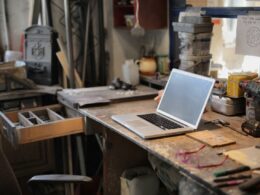Home-based businesses have always been greener than our corporate counterparts. We don’t have brutal gas-gobbling commutes to get to that huge, energy-wasting office building. The little waste we have is easily recycled.
We’re lean and mean and inherently have a smaller carbon footprint.
“The advantage that home-based businesses have in fostering sustainability is singularity of vision,” points out Adam Lowry, a judge of our Home-Based 100, overseeing our Greenest category.
In other words, there are not as many hoops to jump through.
Instead of being parsed out in several directions, like bigger businesses, those working from home have more control over their enterprises and can get greener more quickly and efficiently, says Lowry, who is the co-founder and “chief greenskeeper” of natural-products manufacturer Method Products Inc., based in San Francisco.
Our winner in the Greenest category in the Home-Based 100 is an example of how even a traditional business, not usually associated with sustainability, can make that shift. Fun Photo Guys is a Pleasant Hill-Calif.-based wedding-photography outfit that is green through and through.
The firm is no stranger to StartupNation. Kevin Slovick, one of its co-owners, wrote our site’s tutorial, 9 Steps to Greening Your Business. He’s also a regular on the green lecture circuit, and earlier this year spoke on a panel co-sponsored by Cisco and Cbeyond called “Going Green – What Entrepreneurs Need to Know About Becoming Eco-Friendly.” We like to think of him as the Pied Piper of green.
“As we were going green, I started writing down everything I learned along the way,” Slovick says. “I wanted to share my experience with other businesses that wanted to become green.”
Fun Photo Guys, which is certified by the Bay Area Green Business Program, incorporates eco-friendly practices into all facets of its business. The company’s photography is entirely digital, forgoing the use of the many chemicals used to process film. Instead of sending a series of prints to customers so that they can choose the pictures they would like to highlight, photos are strictly e-mailed, eliminating the need for excessive amounts of paper. Nearly all of the paper and plastic materials they use are recycled, old equipment is donated to needy causes and energy is saved by unplugging unused computers. Slovick and his partner, Stephan Hookano, even installed a water-saving toilet in their home-based office.
The practice has its business advantages, Slovick says. Since promoting these green methods on their website, FunPhotoGuys.com, he has seen a spike in sales. “By going green, we actually improved our Google rating, so we get found easier,” Slovick says. “It’s an eye catcher for them, and it seems to clinch the deal in more than one instance.”
It’s hard to get greener than Robyn Cripse. As the owner of Boulder, Colo.-based Nomad Needles, she sells fashionable bags that allow you to compost in your home – with worms.
“I take the whole environmental thing very seriously,” Crispe admits.
Just follow us here…Composting is all about using your garbage as plant fertilizer and reusing your waste so that nothing ends up in a landfill. Sometimes this process can take a long time because the trash needs to break down. But worms, specifically redworms, or red wigglers as they are called in other locales, love it and create perfect plant food by eating the waste. We’ll leave the whole biology part for you to figure out.
Crispe, who launched her business earlier this year, has always composted. And she’s found a loyal customer base of people who have always wanted to do the same, yet in a fashionable way. They’re curious, yet environmental.
Crispe keeps the educational end of her business simple.
“They don’t want to get too overwhelmed on the scientific end,” she says of her tutorial. “Worm poop equals good fertilizer.”
Being green isn’t just about reusing and saving our natural resources. It can also mean creating sustainable livelihoods for those less fortunate. One of our finalists, Rebecca Kousky, has found a way to provide interest-free micro loans to women in developing countries. Funds for these loans are generated by clothing and crafts made by designers across the world exclusively for Nest, Kousky’s enterprise, and are for sale on the company’s website and numerous boutiques.
By helping others financially in these areas, Kousky, who founded the business in 2006 at age 24, puts in motion a situation where people, with some financial assistance, might not have to seek endangered animals as a food source and can practice ways of cooking and cleaning that are more environmentally friendly. Plus, most of the products Nest sells are made under green conditions, Kousky points out.
“We’re seeing more and more people interpreting green to be more and more encompassing,” she says.
So far Nest helps people in eight countries: Brazil, Guatemala, India, Israel, Mexico, Morocco, Tanzania and Turkey.
To help get the word out, Kousky has dozens of high-profile board members to help get the word out to possible donors. Volunteers work on the ground in locales around the world to find designers, artists and those in need of the loans. A number of media outlets have featured Nest, including CNN.com, Cosmopolitan and Country Living.
“It resonates with a lot of people,” Kousky says. “People care a lot more about where their money goes.” It resonates with us at StartupNation, certainly. Sustainable livelihoods – we love it.






